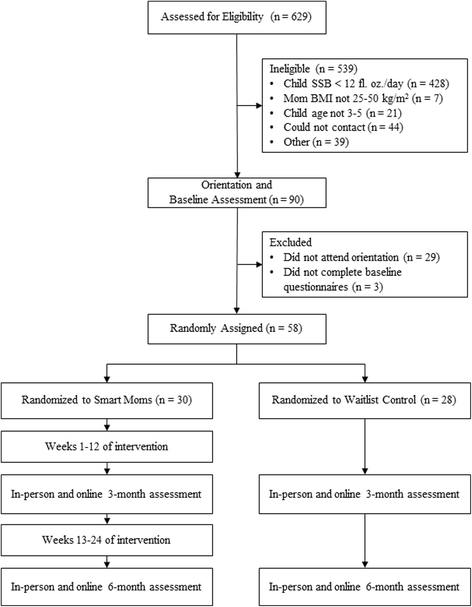A randomized trial to reduce sugar-sweetened beverage and juice intake in preschool-aged children: description of the Smart Moms intervention trial
- PMID: 27542357
- PMCID: PMC4992273
- DOI: 10.1186/s12889-016-3533-8
A randomized trial to reduce sugar-sweetened beverage and juice intake in preschool-aged children: description of the Smart Moms intervention trial
Abstract
Background: Obesity in young children remains a public health concern, and maternal weight is one of the strongest predictors of obesity in early childhood. However, parental adherence in interventions for young children is often low and existing programs have had mixed success. An innovative approach to treatment is needed that increases adherence among mothers and improves weight-related behaviors simultaneously in mothers and children. The objective of the Smart Moms randomized controlled trial (RCT) is to test the efficacy of a 6-month primarily smartphone-delivered program to reduce sugar-sweetened beverage and juice consumption among children ages 3-5 whose mothers are overweight or obese. This paper describes the study design and intervention.
Methods/design: Mother-child dyads were eligible if the mother was overweight or obese, owned a smartphone, and if the child was between the ages of 3-5 and consumed 12 oz or more per day of sugar-sweetened beverages (SSBs) and 100 % fruit juice. Participants were randomly assigned to the Smart Moms intervention or a waitlist control group. The intervention consisted of theoretically grounded and evidence-based behavioral strategies delivered through one group session, lessons on a mobile-optimized website, and text messages. Mothers submitted self-monitoring information via text message and received regular tailored feedback emails from interventionists. The primary outcome is change in child SSB and juice consumption and a secondary outcome is change in maternal weight.
Discussion: This Smart Moms study was designed to determine if a low-burden intervention delivered using mobile methods and targeted towards mothers could be effective at changing child sugar-sweetened beverage intake. Results will indicate if mobile-based methods can be a feasible way to engage mothers in family-based studies and will inform successful strategies to prevent childhood obesity through parent-targeted approaches.
Trial registration: Clinicaltrials.gov NCT02098902 (Registered March 25, 2014).
Keywords: Early childhood; Intervention; Maternal obesity; Obesity; Sugar-sweetened beverages.
References
-
- CDC . Obesity among low-income preschool children. 2010.
-
- Burke V, Beilin LJ, Dunbar D. Family lifestyle and parental body mass index as predictors of body mass index in Australian children: a longitudinal study. International journal of obesity and related metabolic disorders : journal of the International Association for the Study of Obesity. 2001;25(2):147–157. doi: 10.1038/sj.ijo.0801538. - DOI - PubMed
Publication types
MeSH terms
Substances
Associated data
Grants and funding
LinkOut - more resources
Full Text Sources
Other Literature Sources
Medical


